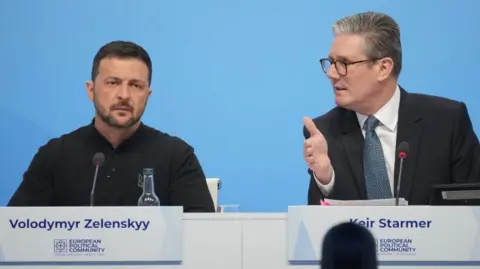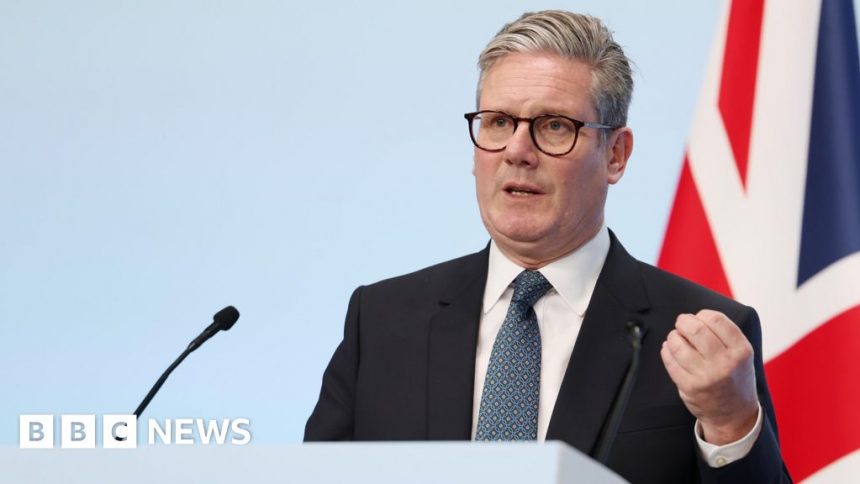UK pledges £84m to stop illegal migration ‘at source’
Prime Minister Sir Keir Starmer has pledged £84m for projects in Africa and the Middle East to stop illegal migration “at source”.
The government said the new funding for education, employment opportunities and humanitarian support would help address the factors driving people to leave their homes.
Speaking at the fourth summit of the European Political Community (EPC), which the UK hosted at Blenheim Palace in Oxfordshire, Sir Keir agreed with French President Emmanuel Macron that there was “no easy silver bullet” to stop small boats crossing the English Channel.
But the PM said he wanted to focus on “practical solutions”, not “gimmicks”.
The EPC, which includes the 27 members of the European Union as well as 20 non-members like the UK, is a more informal forum for cooperation.
The summit has focused on the challenge of illegal migration, as well as support for Ukraine.
Speaking at a news conference, Sir Keir said he wanted to reset the UK’s approach to illegal migration and deepen cooperation with Europe on defence and border security.
The PM said illegal migration needed to be tackled “upstream” and there was a “consensus” at the summit that the focus needed to be on taking down smuggling gangs.
The UK has agreed new initiatives with Slovenia and Slovakia to tackle organised crime.
Meanwhile, the Foreign Office said £84m of funding would be rolled out over the next three years to address the factors driving people into small boats.
Projects set to get funding include programmes helping Syrian refugees in Jordan and Lebanon to access education and jobs, as well as migrants in North and East Africa to fill local skills gaps, and humanitarian aid for displaced people in war-torn Sudan.
Stopping people crossing the Channel in small boats is one of the major challenges facing the new government.
Sir Keir has scrapped the Conservative plan to send some people who arrive in the UK illegally to Rwanda, describing it as an “expensive gimmick”.
The plan was stalled by legal challenges and no migrants were sent to the east African country under the scheme before the general election.
Instead the PM has promised to set up a new Border Security Command, bringing together Border Force officials, police and intelligence agencies, and to use counter-terror powers to combat people-smuggling gangs.
Sir Keir accused the previous government of a “dereliction of duty” on migration and wasting time on the Rwanda scheme.
The PM said the new government would not be able to turn around the record number of small boat arrivals overnight, but he was pursuing a “serious response”.
Sir Keir also sought to stress his “profound respect” for international law, reiterating that under his leadership the UK would not be leaving the European Convention on Human Rights, something which had been hinted at by the Conservatives.
Coming just two weeks after the election, the gathering provided an opportunity for Sir Keir to meet many of his European counterparts on the margins of the summit, including Italy’s Georgia Meloni and Albania’s Edi Rama.
A Downing Street spokeswoman said Sir Keir discussed “innovative solutions” to migration with the Albanian PM, including Italy’s plan to send migrants to Albania for processing.
Asked if he could rule out the UK pursuing offshore processing, Sir Keir said this was not “central” to discussions at the summit as the focus was on “taking the [smuggling] gangs down in the first place”.
However, he added: “I’m a pragmatist and I’ve always said we’ll look at what works.
“And where cases can be processed closer to origin, then that is something which of course ought to be looked at.”
Sir Keir has said he wants to “reset” relations with the UK’s European neighbours following Brexit.
While the government is not seeking to rejoin the EU, it wants to reach a security agreement with the bloc to help cooperation on intelligence and policing, as well as address some of the trading problems under the current Brexit agreement.
French President Macron welcomed attempts to reset relations but warned the UK would not be able to “cherry pick” a new deal.
 Getty Images
Getty ImagesThe EPC was born in the months following Russia’s invasion of Ukraine and the issue remained a key focus of the latest gathering.
Sir Keir pledged to stand with Ukraine “for as long as it takes” and called on European leaders to do more to support the country.
Nato’s outgoing secretary general Jens Stoltenberg said the military alliance had to be prepared for the Ukraine conflict to go on for a decade or more.
“The stronger our support for Ukraine and longer we are willing to commit, the sooner this work can end,” he told the BBC.
The summit also took place against the backdrop of the US presidential campaign.
Republican candidate Donald Trump has expressed scepticism over the continued US funding for Ukraine’s defence, while his running mate JD Vance has been a vocal critic of aid for the country.
Asked if he was worried about their positions, Sir Keir said it was for the American people to decide their president and “we will work with whoever is elected”.
He added that the government was committed to the “special relationship” between the UK and the US.








